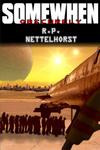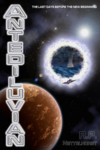"How are you feeling?" her aunt Misti asked.
"I feel like a rainbow is hugging me!"
--my middle daughter, Toni, about a half hour after awakening from surgery on her ankle.
Apparently they gave her some really good drugs.
Tuesday, August 31, 2010
Monday, August 30, 2010
Quote for the Day
Life is pleasant. Death is peaceful. It's the transition that's troublesome.
--Isaac Asimov
--Isaac Asimov
Thursday, August 12, 2010
Sufficiently Advanced
Arthur C. Clarke once wrote that "Any sufficiently advanced technology is indistiguishable from magic." That's called Clarke's Third Law. Gehm's Corollary to Clarke's Third Law is "Any technology distinguishable from magic is insufficiently advanced." I have a Nexus One Google phone running Android 2.2 (Froyo). Google just released a new application for it, Voice Search.
I tried it out. My phone is now sufficiently advanced. Check out the video:
I tried it out. My phone is now sufficiently advanced. Check out the video:
Apparently There Aren't Enough Nuclear Weapons to Destroy the World
We commonly hear that we have enough nuclear weapons to destroy the world five times over. Apparently, there are enough to only destroy a tiny fraction of it once, if these statistics are accurate:
Check out How I Learnt To Stop Worrying And Love The Bomb (Kinda)
Check out How I Learnt To Stop Worrying And Love The Bomb (Kinda)
Tuesday, August 10, 2010
Quote for the Day
If it was easy, everyone would do it rather than going around telling you their ideas and saying how they could be a writer if they had the time.
--Arthur M. Jolly, interview with Write On Online (2009)
--Arthur M. Jolly, interview with Write On Online (2009)
Monday, August 09, 2010
CultureLab: The faith that underpins science
An interesting and short review of the book, Why Beliefs Matter: Reflections on the nature of science by E. Brian Davies, Oxford University Press appears in New Scientist Magazine:
CultureLab: The faith that underpins science
The description of the book from Amazon.com:
CultureLab: The faith that underpins science
The description of the book from Amazon.com:
This book discusses deep problems about our place in the world with a minimum of technical jargon. It argues that 'absolutist' ideas dating back to Plato continue to mislead generations of theoretical physicists and theologians. It explains that the multi-layered nature of our present descriptions of the world is unavoidable, not because of anything about the world but because of our own human natures. It tries to rescue mathematics from the singular and exceptional status that it has been assigned, as much by those who understand it as by those who do not. It provides direct quotations from many of the important contributors to its subject, and concludes with a penetrating criticism of many of the recent contributions to the often acrimonious debates about science and religions.
Sunday, August 08, 2010
Artificial life forms evolve basic intelligence - life - 04 August 2010 - New Scientist
An article in New Scientist Magazine describes how artificial lifeforms evolve, and develop rudimentary intelligence:
Artificial life forms evolve basic intelligence - life - 04 August 2010 - New Scientist
Artificial life forms evolve basic intelligence - life - 04 August 2010 - New Scientist
Friday, August 06, 2010
On this Day
On this day many will recall the fate of Hiroshima, when up to 140,000 were killed and 69 per cent of the city was destroyed. It may be useful to put Hiroshima's destruction into its sad context.
The Japanese Empire is responsible for starting the conflict by its attempt to conquer and annex China and other parts of Asia. It killed millions of people in China (most notoriously, the Rape of Nanking in 1937-38, when at least 200,000 civilians were slaughtered). Later, Japan attacked the United States at Pearl Harbor because of economic sanctions the U.S. leveled in response to Japanese aggression in China. In all, the Imperial Empire of Japan was responsible for the deaths of 15.5 million people between 1937 and 1945. Far more Japanese died from conventional bombings by the United States over the course of the war. For instance, a single raid by 334 B-29s on Tokyo on March 10, 1945 resulted in the destruction of 25 percent of the city and the deaths of 100,000.
The Empire of Japan was militeristic and bent on conquest. It took two atomic bombs to barely convince the Emperor to surrender--and his military commanders then attempted a military coup to overthrow him so they could continue the war.
For those who fear atomic weapons, remember that they've only been used twice since their invention more than 60 years ago. Far more people have died--and continue to die--from conventional weapons. Eliminating atomic weapons will not bring about peace. We had war before they were invented and we've had wars since, without using them.
Estimates of people killed by Japan in World War II.
The Japanese Empire is responsible for starting the conflict by its attempt to conquer and annex China and other parts of Asia. It killed millions of people in China (most notoriously, the Rape of Nanking in 1937-38, when at least 200,000 civilians were slaughtered). Later, Japan attacked the United States at Pearl Harbor because of economic sanctions the U.S. leveled in response to Japanese aggression in China. In all, the Imperial Empire of Japan was responsible for the deaths of 15.5 million people between 1937 and 1945. Far more Japanese died from conventional bombings by the United States over the course of the war. For instance, a single raid by 334 B-29s on Tokyo on March 10, 1945 resulted in the destruction of 25 percent of the city and the deaths of 100,000.
The Empire of Japan was militeristic and bent on conquest. It took two atomic bombs to barely convince the Emperor to surrender--and his military commanders then attempted a military coup to overthrow him so they could continue the war.
For those who fear atomic weapons, remember that they've only been used twice since their invention more than 60 years ago. Far more people have died--and continue to die--from conventional weapons. Eliminating atomic weapons will not bring about peace. We had war before they were invented and we've had wars since, without using them.
Estimates of people killed by Japan in World War II.
How Many Books Are in the World?
From Slashdot.org:
The Google Books blog has an explanation of how they attempt to answer a difficult but commonly asked question: how many different books are there? Various cataloging systems are fraught with duplicates and input errors, and only encompass a fraction of the total distinct titles. They also vary widely by region, and they haven't been around nearly as long as humanity has been writing books. "When evaluating record similarity, not all attributes are created equal. For example, when two records contain the same ISBN this is a very strong (but not absolute) signal that they describe the same book, but if they contain different ISBNs, then they definitely describe different books. We trust OCLC and LCCN number similarity slightly less, both because of the inconsistencies noted above and because these numbers do not have checksums, so catalogers have a tendency to mistype them." After refining the data as much as they could, they estimated there are 129,864,880 different books in the world.
An Overview of the ISS from Space.com
From Space.com:
The International Space Station is the most expensive object ever constructed by the human race.

Source Space.com: All about our solar system, outer space and exploration
The International Space Station is the largest structure ever built in space. Its backbone-like main truss is as long as a football field and the station can clearly be seen from Earth by the naked eye, sometimes rivaling the planet Venus in brightness. Today, the space station is home to crews of up to six astronauts representing five different space agencies and 15 countries that built it. Construction on the $100 billion International Space Station began in 1998 and is expected to be completed by mid-2011. SPACE.com looks at the space station from the inside out to take a close look at orbiting lab.
The International Space Station is the most expensive object ever constructed by the human race.
Source Space.com: All about our solar system, outer space and exploration
Tuesday, August 03, 2010
Sunday, August 01, 2010
Quote for the Day
Occasionally he stumbled over the truth, but hastily picked himself up and hurried on as if nothing had happened.
--Winston Churchill, commenting on Stanley Baldwin. Cited in Churchill by Himself: The Definitive Collection of Quotations, edited by Richard Langworth, p. 322 (2008)
--Winston Churchill, commenting on Stanley Baldwin. Cited in Churchill by Himself: The Definitive Collection of Quotations, edited by Richard Langworth, p. 322 (2008)
Subscribe to:
Comments (Atom)




